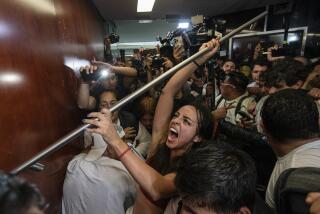Chile Votes for Constitution Reform : Both Sides Backed Measures to Ease Return to Democracy
SANTIAGO, Chile — Voters overwhelmingly approved 54 reforms to Chile’s military-written constitution on Sunday, authorizing changes that pave the way for a transition to democracy after nearly 16 years of rule by the armed forces.
In a rare agreement, both President Augusto Pinochet and the political opposition had supported the referendum proposal.
The government said late Sunday that with 14,109 of the nation’s 23,000 polling stations reporting, the referendum was passing by a vote of 676,933 to 363,926; 256,687 ballots were invalid or blank.
Officials said that about 80% of voters cast ballots in some districts, but the overall percentage was not given.
Gen. Pinochet and opposition leader Patricio Aylwin were among the first to cast their votes in the “yes” or “no” ballot on the reforms, agreed on between the government and its opponents last month.
The reforms will make it easier for a future Congress to introduce further changes to the constitution.
Civilians will be given an equal voice with the military on a National Security Council empowered to question government decisions, and a blanket ban on Marxist parties will be lifted, although the government can still bar groups that advocate political violence.
The president will no longer be able to exile opponents, a power Pinochet used extensively to rid himself of dissidents.
But the changes leave intact Pinochet’s constitutional right to remain for eight more years as army commander in chief, a post he now holds with that of president.
He can also appoint one-fifth of the future upper house of Congress as well as many mayors.
“There is no confrontation in this plebiscite (which) opens a route of hope to the reconstruction of democracy in our country,” Aylwin, the opposition candidate in December’s presidential elections, told journalists.
There was little voter interest in the referendum. Experts said citizens were confused by the long, often highly technical text of the amendments.
Pinochet and his opponents both called on Chileans to approve the package, but they differed sharply in their pre-election propaganda on the significance of the vote.
The opposition sees the reforms as a first step toward full democracy, but the government portrayed them as giving stability to the constitution.
“Those who voted ‘I approve’ have shown that they understand it is necessary to give stability to our political system,” said Gen. Oscar Vargas, the government’s chief spokesman.
Opposition parties, favored by opinion polls to win the December election, have pledged further reform once in power.
Pinochet, 73, who had once said he would not change a comma of the constitution drawn up to his specifications in 1980, was forced to agree to the reforms after losing a plebiscite last October on his continued rule.
His defeat led to the calling of presidential and congressional elections.
Changes Demanded
Dissidents demanded changes to the controversial charter--which they say is undemocratic and leaves too much power in military hands--ahead of a planned handing over of power next March.
Their calls were echoed by conservative parties and some civilian members of Pinochet’s government, who feared the opposition could turn the reform issue to their advantage in the December vote.
Government officials reported calm as Chile’s 7.6 million voters went to the polls. Full election results are expected today.
Voting is mandatory, and citizens who fail to cast a ballot may be fined more than $90, a steep amount in a country where about one-third of the 4.5 million labor force earns the $66 monthly minimum wage.
Warning on Amnesty
Chile’s air force chief Sunday warned of grave consequences if a future opposition government carried out a pledge to revoke an 11-year-old amnesty law covering alleged human rights violations.
“If tomorrow they try and pillory us like in Argentina, this is going to have the gravest consequences,” Gen. Fernando Matthei told the Mercurio newspaper.
Opposition parties have pledged to annul the amnesty decreed by Pinochet in 1978, five years after he came to power in a bloody coup.
More to Read
Sign up for Essential California
The most important California stories and recommendations in your inbox every morning.
You may occasionally receive promotional content from the Los Angeles Times.










